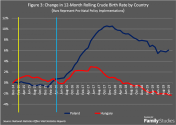Will this have a plan for couples physically unable to have kids or infertile?
Sure, they pay the tax. People are going to get whacked with the stick who don't deserve to be. Tough.
Really? You know the reasons why all people in history had children?
I've a pretty good idea.
What about the most common reason people have children today - because they like children and want them?
Sure, the evolutionary impulse is there but there are strong countervailing factors and they're winning mightily.
What about the religious obligation, or a cultural moral duty to have children, and for a male a sign of virility?
Contrary to what you think, it's ultimately
all economics. Cultural and religious factors are the detritus of dead economies where high fertility was a successful economic and geopolitical strategy. Pro-natal norms emerged due to this success and stuck around after the economic fundamentals changed. Take the example of the Islamic world where there are strong pro-natal norms - the countries in that sphere are uniformly backward and, unless there's hydrocarbons, poor. The populations are expanding but they have no economic utility because they're uneducated and have no access to the technology necessary to compete.
Thanks to decades of western subreplacement fertility rates and multiple failures, we have a lot of data on what works and doesn't work. Financial incentives don't work, they only lead to a temporary increase in births. If you are thinking only about economics, children will always be a bad idea.
That's only true of present economic incentives, which is what I argue must change. As for financial incentives, there are two reasons why these data are inapplicable to China:
- These programs were all implemented by democracies, and failure is the default outcome for any program implemented by a democracy.
- More importantly, it's all (paltry) carrots and no stick. That's never going to work. The carrot doesn't work without the stick and vice versa.
The only successful method has been immigration from higher fertility regions such as the Middle East, Africa and Latin America. This is the only reason why western European fertility rates are slightly above eastern Asia.
You're talking about the West and that's not a discussion I care to have. I consider the West a failure, so I'm not really interested in intellectually wading into their failures.
Low fertility rates are a symptom of liberalism, and that includes feminism, homosexuality and many tenants of the modern western lifestyle. Very low rates seen in Japan & South Korea are a result of the above PLUS low immigration rates.
First of all, how much traction does feminism, homosexuality, etc. have in China? I don't care about plummeting fertility in the West. I'd be overjoyed if no Western woman ever had a child again. I care about China and the factors relevant to China.



